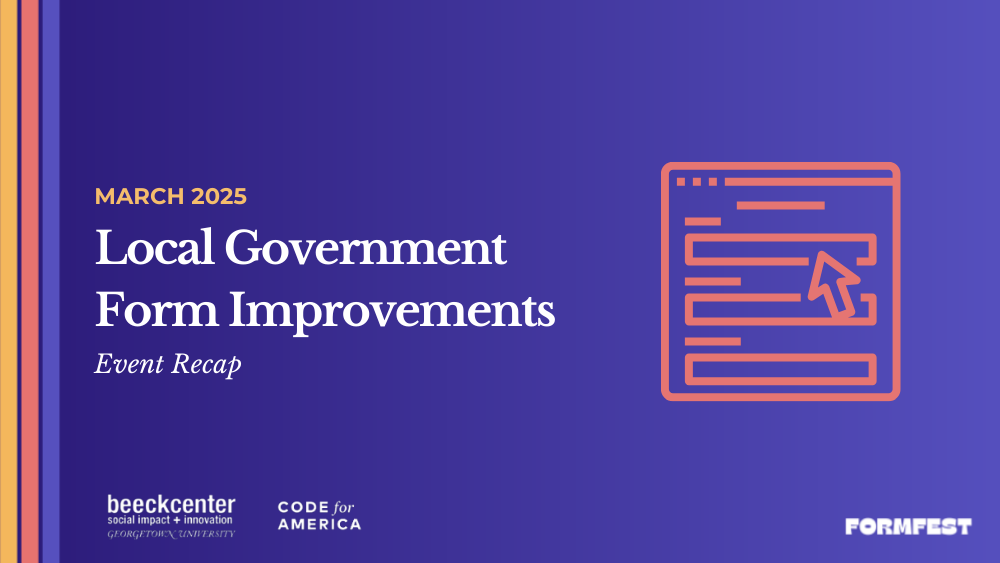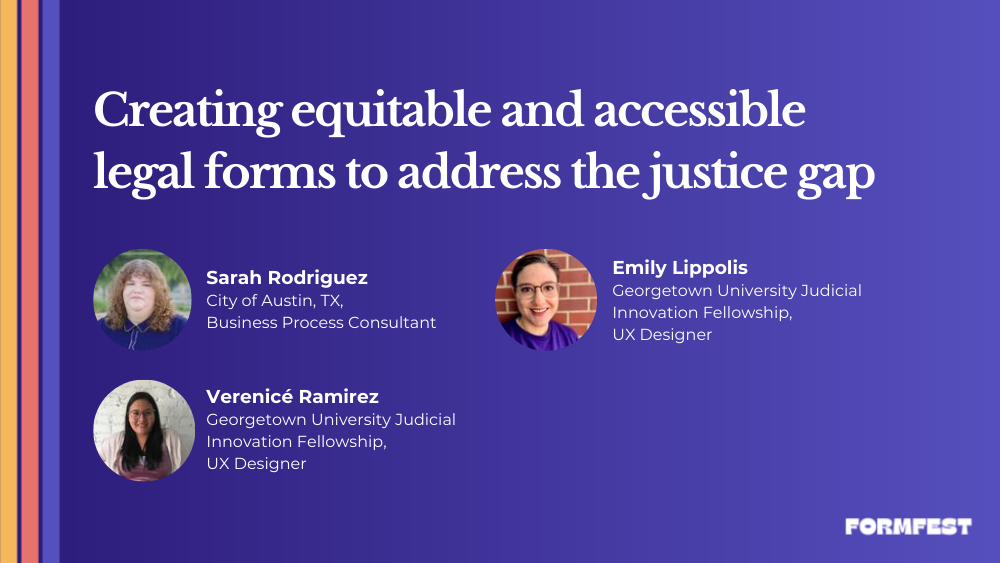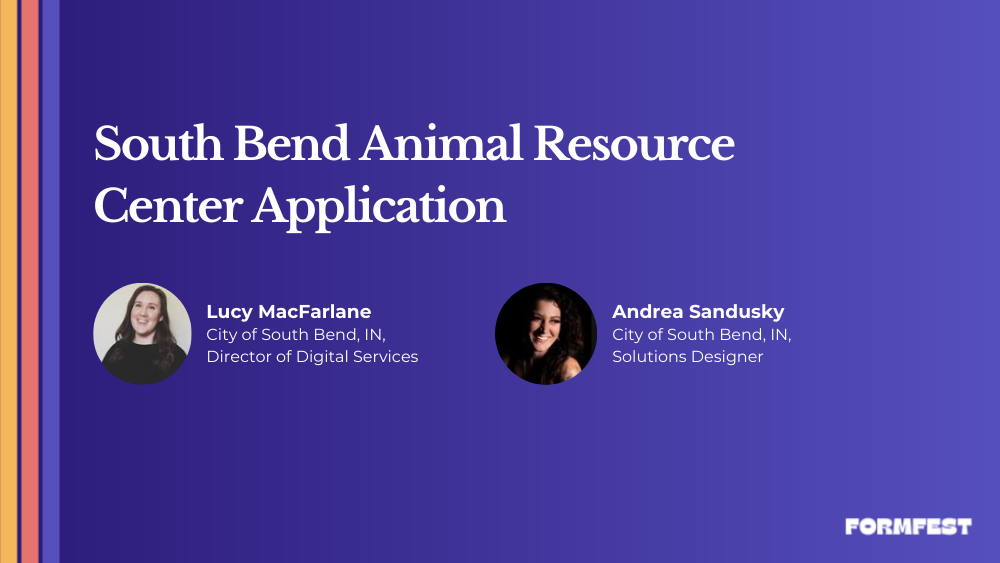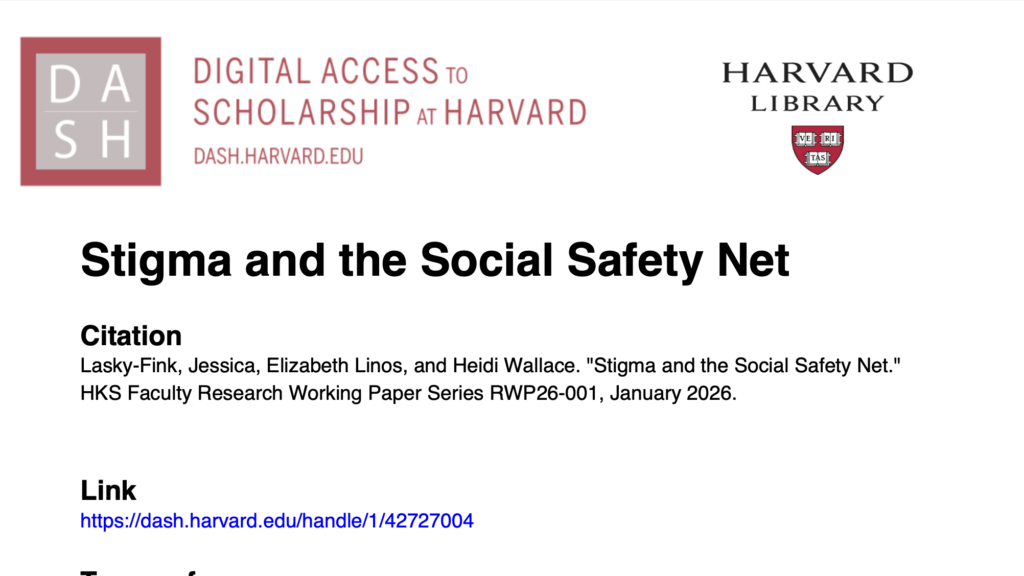FormFest 2024 Recap: Local Government Form Improvements
An event recap from one of FormFest 2024’s breakout sessions featuring speakers from South Bend Indiana and others working on creating accessible legal forms.

This FormFest 2024 session featured work in Austin, Texas on criminal justice forms and the Animal Resource Center’s efforts in South Bend, Indiana to redevelop animal adoption forms. Speakers focused on how trauma-informed frameworks could be integrated into the design of legal forms and systems to improve accessibility and equity for users.
Creating Equitable and Accessible Legal Forms to Address the Justice Gap

The session at FormFest 2024 featured three key speakers: Sarah Rodriguez, Emily Lippolis, and Verenicé Ramirez. Lippolis discussed her project in Kansas, where she worked on creating an accessible digital tool for self-represented litigants—essentially developing a “TurboTax” for the legal system. This system aimed to guide individuals through legal forms without requiring them to interact with the forms directly. Rodriguez, a designer with experience in digital innovation in government, shared her work on the mobile court program in Austin, Texas. This initiative brings court services to individuals in the community, addressing quality-of-life misdemeanors like disruption in public spaces, and allowing those experiencing homelessness to avoid cycles of criminalization. Ramirez, also a judicial innovation fellow, discussed her work with the Utah State Court, focusing on redesigning paper legal forms through UX methods. She highlighted the importance of trauma-informed design when addressing design challenges for self-represented litigants who face traumatic experiences.
The speakers also emphasized the importance of creating systems that acknowledge and respond to trauma, particularly for those who are self-represented or experiencing homelessness. They discussed key design principles such as safety, trust, and transparency, and provided examples from their work. For instance, in Rodriguez’s mobile court project, the team worked with people with lived experience of homelessness to identify and address barriers, such as confusing questions on forms or fears about law enforcement, which could deter individuals from engaging with the legal system altogether. Additionally, the speakers highlighted the broader implications of the justice gap, noting that 60% of Americans have experienced legal problems in the past four years, with many feeling unsatisfied with the results due to the complexities of the legal system. By improving the accessibility of legal resources, the speakers aim to equip individuals with the knowledge and tools to take meaningful action to protect their legal rights.
South Bend Animal Resource Center Application

Lucy MacFarlane leads a newly-formed digital services team in South Bend, Indiana aimed at enhancing both internal city operations and community-facing online services. The team prioritizes tackling administrative inefficiencies and digital transformation, with a focus on low-code solutions that streamline processes for both staff and community members. They work closely with various city departments, emphasizing a collaborative approach to understanding departmental needs and building tailored solutions.
One key initiative was the department’s collaboration with South Bend’s Animal Resource Center, where MacFarlane’s team tackled inefficiencies in the pet adoption application process. The existing process was bogged down with repetitive questions, poor communication, and unnecessary delays. Through a “listen first, build with” approach, the team spent significant time observing the current workflows and mapping out pain points. This allowed them to design a streamlined adoption form, eliminating redundant questions and integrating a feature to upload documents, which significantly improved efficiency and the user experience. Andrea Sandusky described how they replaced Microsoft Forms with Jotform, introducing conditional logic, email notifications, and streamlined document-tracking through Microsoft’s SharePoint program. This change not only reduced the administrative workload, but also improved real-time access for both shelter staff and animal control officers, creating smoother communication and fostering more successful adoptions. The team’s focus on user-centered design—through agile sprints, iterative feedback, and testing—ensured continuous improvement and alignment with actual needs.
Key Takeaways
- Listen first, innovate second. Both teams demonstrated how deeply understanding user experiences before building solutions led to meaningful improvements. The trauma-informed legal team observed barriers faced by homeless individuals, while South Bend’s “listen first, build with” approach included site visits and staff shadowing prior to the redesign of the pet adoption process.
- Real solutions come from real people. User feedback turns good intentions into great services. In both sessions, speakers emphasized how success was driven by working closely with users and departments, ensuring solutions were tailored to real needs through feedback, observation, and iterative design.
- Small changes create meaningful impact. In both presentations, seemingly minor improvements—like conditional logic in pet adoption forms or privacy-preserving URLs for legal documents—dramatically transformed experiences for users. These simple adjustments reduced processing times from weeks to days and made complex systems more accessible to those who needed them most.
See more from this session at FormFest 2024:
Watch the session recording and more from FormFest 2024.
Local Government Form Improvements
This session from FormFest 2024 featured the work in Austin, Texas on criminal justice forms, and the South Bend, Indiana Animal Resource Center’s efforts to redevelop their animal adoption forms.
Less Jargon, More Compassion: A FormFest 2024 Profile
A profile on FormFest speakers Sarah Rodriguez, Emily Lippolis, and Verenice Ramirez, featuring stories about their motivations for working on public sector form innovation.
About FormFest
FormFest is a free virtual event showcasing governments working to make services accessible to everyone through online forms. Discover best practices and tools that are shaping the future of form design and service delivery.


